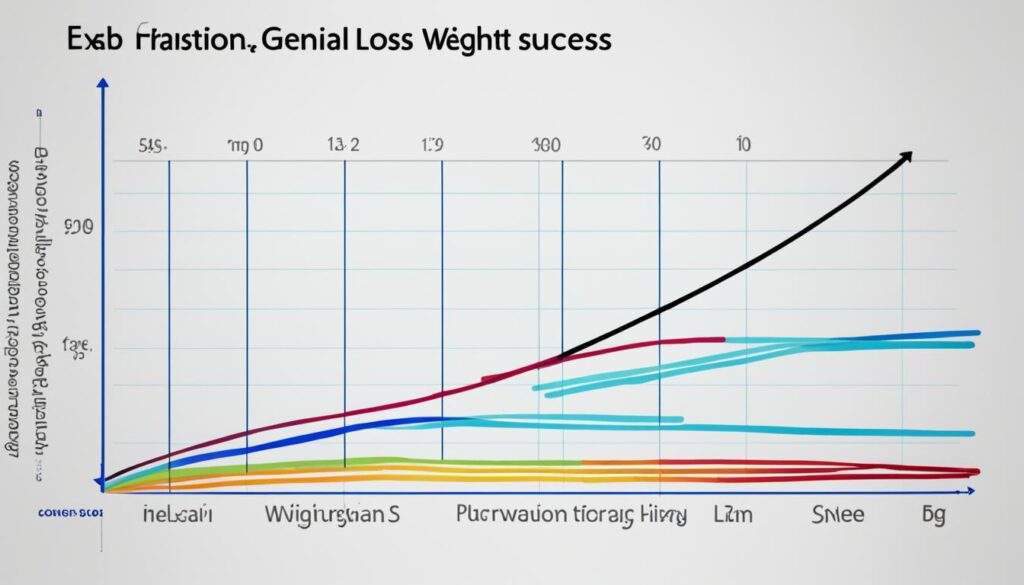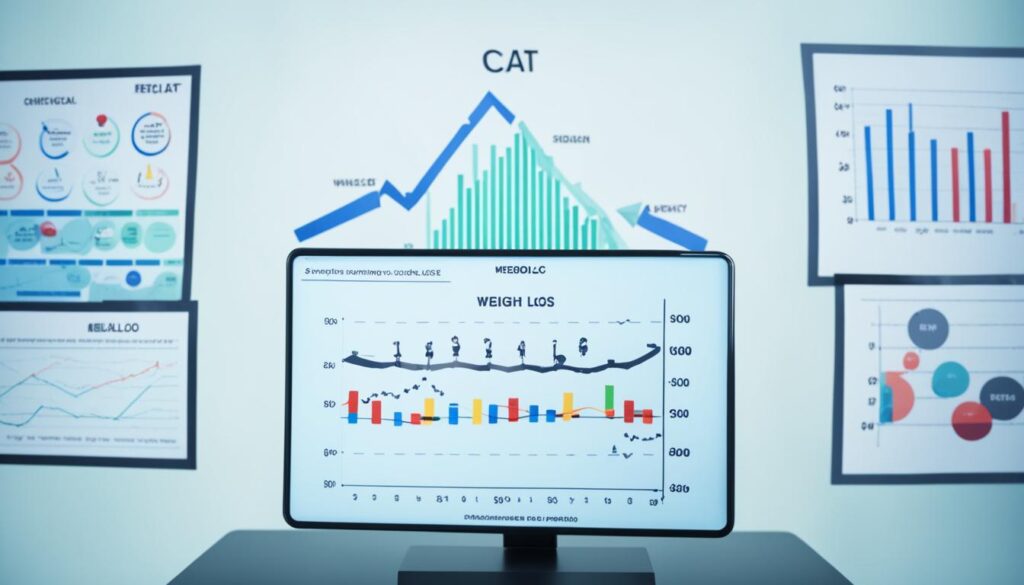Have you ever felt like your weight loss hit a wall? You’re watching what you eat and working out, but the scale just won’t move. It’s frustrating, but don’t let it get you down. Plateaus are just a normal part of the journey. They do raise a big question, though: why do they happen?
So, why do our bodies sometimes stop losing weight? Well, funny enough, these plateaus can stick around for up to eight to twelve weeks. Yes, that’s quite a while. But, there’s a light at the end of the tunnel. Weight loss plateaus may feel like they’ll last forever, but they’ll go away. Our bodies are always shifting and adjusting. This is especially true when we’re trying to lose weight.
The process of our body not burning as many calories as we lose weight is part of the issue. It’s kind of like a car that uses less gas as it loses weight. This change can make it harder for us to drop those pounds.
Also, our bodies are smart. They have a “set point” weight, where they like to hang out. This range is about 5-10% of our body weight. When we get close to this weight, our body sometimes stops trying to lose more. It’s like it’s putting on the brakes to keep things in check.
If we understand these reasons, we have a better shot at getting through these tough spots. Weight loss isn’t always straightforward. Plateaus are a part of the journey. They aren’t the end of it. Stick with us to learn more about these times when our weight loss stalls and how to push through.
Understanding Weight Loss Plateaus
Weight loss can be a bumpy ride. You start strong, dropping pounds quickly, but then suddenly hit a wall. Sound familiar? This frustrating experience is called a weight loss plateau. Let’s talk about why this happens and what to do about it.
What is a weight loss plateau?
A weight loss plateau happens when your scale stops moving, even though you keep trying. You’re still eating right and exercising hard. But, you see no change in the numbers. It’s like your body decided to take a weight loss break.

Common causes of stalled weight loss
Several factors can make your weight loss efforts stall. These include:
- Eating more than you realize
- Not adjusting your calorie intake as you lose weight
- Losing muscle mass, which slows metabolism
- Hormonal changes affecting hunger and energy use
The role of metabolism in weight loss
Your metabolism plays a huge part in weight loss. When you lose weight, your body needs fewer calories to function. This can slow down your weight loss process. Your body tries to save energy, making it harder to burn fat fast.
Understanding these points can help you beat a weight loss plateau. Remember, hitting a wall is normal and it will pass. With the right moves, you can start losing again and reach your health goals.
The Science Behind Weight Loss Stalls

Many people find their weight loss stopping suddenly. Known as a weight loss plateau, this is a big surprise even when you’re watching your diet and exercising. It happens to nearly everyone trying to lose weight.
The reason you might not see progress is complex. At first, we lose water weight as our body’s energy is used up. Then, we might lose muscle, which slows down how many calories we burn. This can happen as we lose more weight.
Our bodies get used to eating less for energy. They become slower at burning calories and make us feel more hungry. This is our body’s way of trying to keep at a certain weight, or ‘set point.’
- Hormonal changes affect appetite and metabolism
- Stress and poor sleep can disrupt hormonal balance
- Body composition changes slow down metabolism
When we lose nearly every 2 pounds, we might feel like eating 83 more calories each day. This might stop our weight from dropping more. Research shows that people in a study cut 800 calories daily at first. But later, they could only keep up a 200-calorie cut.
Knowing these reasons can help come up with plans to beat plateaus and keep losing weight. It’s key to review how we’re trying to lose weight and change some things to keep going forward.
Why Has My Weight Loss Stopped? Common Reasons Explored
Weight loss plateaus can be really annoying. I’ve been through them too. Let’s look at why our weight loss might slow down. We’ll check out common causes for these plateaus.
Calorie Intake vs. Energy Expenditure
As I lost weight, my body needed less fuel. Having a smaller calorie gap made my progress slower. It was key to accurately watch what I was eating. Also, letting myself enjoy food on weekends kept me focused all week.
Changes in Body Composition
Losing muscle means my body burns less. I found out muscle uses more energy than fat. Adding weight exercises helped me keep my muscle. This increased the calories I use every day.
Hormonal Factors Affecting Weight Loss
Hormones are a huge part of losing weight. Not sleeping enough made me want to eat more. I made sure to sleep 7 hours every night. This made sticking to my plan easier.
Stress also messed up my weight loss by making more tummy fat. I tried mindfulness for stress. Eating within certain hours helped my hormones and kick-started my weight loss again.
Knowing these common plateaus helped me beat mine. By fine-tuning what I eat, keeping my muscles, and improving my hormones, I jumped back into my weight loss journey.
Nutrition Strategies to Restart Weight Loss
Overcoming a weight loss plateau is tough, but changing my diet helps a lot. As we lose weight, our body needs less food to keep going. So, eating fewer calories slows our progress. If we lose 5-10% of our weight, our bodies use up less energy when at rest. This means cutting calories smartly is key to moving past a weight loss pause.
Reassessing calorie intake
To start losing weight again, I first check how many calories I need each day. I do this based on my recent weight and how much I move. I might eat a bit less or do more exercise to burn extra calories. It’s important not to cut too many calories. Doing so can actually make our bodies use less energy, making weight loss harder.
Optimizing macronutrient balance
Getting the right mix of macronutrients is crucial for weight loss. I found success by eating more protein. Aim for 0.8 to 1 gram of protein per kilogram of weight. Protein helps keep your muscles strong and your metabolism higher. It also stops you from feeling hungry too soon, which can lead to eating too much.
The importance of fiber and protein
Eating foods that are high in fiber with plenty of protein has changed my weight loss journey. Fiber helps with digestion and makes you feel full. Protein stops you from wanting to snack on high-calorie foods all the time. These nutrition tricks, along with staying active and managing stress, have helped me keep losing weight.
